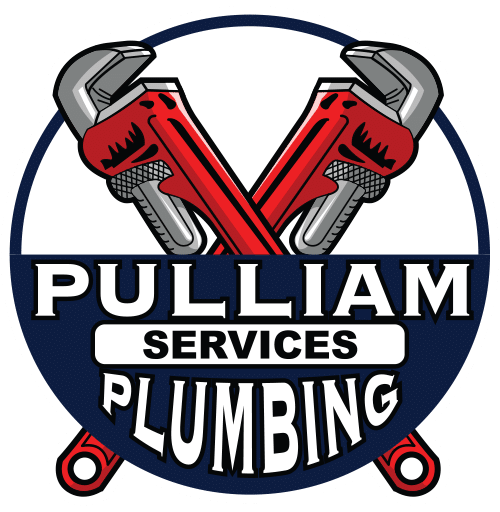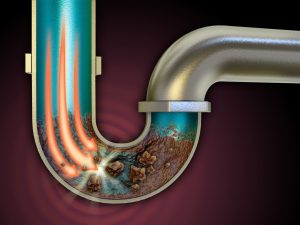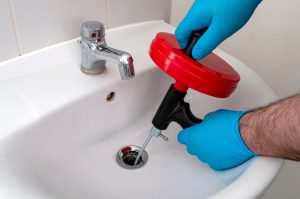Restaurant operations in Boerne and Fair Oaks Ranch face unique drainage challenges that combine our region’s extreme hard water conditions with high-volume food service demands. The limestone-rich Edwards Plateau water, combined with grease, food particles, and cleaning chemicals, creates the perfect conditions for severe drain blockages that can shut down kitchen operations. Understanding comprehensive drain maintenance protects your business investment and ensures consistent service to customers.
Understanding Commercial Kitchen Drain Challenges
Hard Water Complications in Food Service
Our region’s extremely hard water (up to 358 mg/L) creates mineral deposits that compound normal kitchen drainage problems. Calcium and magnesium buildup combines with grease and food particles to create concrete-like blockages that resist conventional cleaning methods.
Commercial dishwashers and pre-rinse spray valves operating with hard water deposit minerals throughout drainage systems daily. These deposits accumulate faster in high-temperature environments typical of commercial kitchens, requiring more aggressive maintenance protocols than residential applications.
Grease and Oil Management
Texas Hill Country restaurants serving traditional barbecue, Tex-Mex cuisine, and comfort foods generate significant grease volumes that challenge drainage systems. Grease trap effectiveness decreases in hard water environments, allowing more fats, oils, and grease (FOG) to enter drain lines.
High summer temperatures in Boerne and Fair Oaks Ranch kitchens cause grease to liquefy and flow freely into drains, then solidify in cooler pipe sections. This cycle creates progressive blockages that worsen without proper maintenance.
Food Particle Accumulation
Commercial food preparation generates substantial organic waste that combines with mineral deposits to create challenging drain blockages. Vegetable peels, meat scraps, and starch particles bind with hard water minerals to form dense accumulations resistant to water flow.
Preventive Maintenance Protocols
Daily Cleaning Procedures
Implement rigorous daily cleaning procedures that address both organic waste and mineral accumulation. Hot water flushes alone prove inadequate in hard water environments and may actually worsen mineral deposition problems.
Train kitchen staff to scrape plates thoroughly before washing and to avoid disposing of food waste through drain systems. Even small amounts of organic matter accelerate blockage formation in mineral-rich water environments.
Weekly Deep Cleaning
Schedule weekly enzymatic treatments specifically designed for hard water environments. Standard enzyme products often fail in high-mineral water conditions, requiring specialized formulations that remain active despite calcium and magnesium interference.
Perform weekly grease trap pumping and cleaning during slower business periods. Hard water accelerates grease trap filling and reduces treatment efficiency, requiring more frequent service than manufacturers typically recommend.
Monthly Professional Service
Schedule monthly professional drain cleaning services that include high-pressure water jetting capable of removing mineral deposits and grease accumulations. Standard snake cleaning proves inadequate for hard water blockages common in Hill Country restaurants.
Professional service should include video inspection to identify developing problems before they cause complete blockages during peak business periods. Early intervention costs significantly less than emergency repairs during dinner rush periods.
Grease Management Systems
Grease Trap Optimization
Size grease traps appropriately for both waste volume and hard water conditions. Undersized units fail rapidly in mineral-rich environments, while oversized units may not maintain proper temperatures for effective grease separation.
Install grease recovery devices that remove solidified grease before it enters drainage systems. These devices prove particularly valuable in hard water environments where traditional grease traps lose efficiency rapidly.
Automatic Dosing Systems
Consider automatic chemical dosing systems that introduce enzyme treatments and mineral control agents continuously. These systems maintain consistent treatment levels despite varying water usage and waste load patterns.
Automatic systems reduce labor costs and ensure consistent treatment during busy periods when manual procedures may be overlooked or performed inadequately.
Equipment-Specific Maintenance
Dishwasher Drain Systems
Commercial dishwashers require specialized attention in hard water environments. Install water softening systems specifically for dishwashing operations to reduce mineral deposition in drain lines and improve cleaning effectiveness.
Clean dishwasher sumps and drain connections weekly to remove accumulated food particles and mineral deposits. Standard cleaning procedures often miss these critical areas where blockages frequently develop.
Floor Drain Management
Restaurant floor drains collect significant amounts of organic waste, cleaning chemicals, and mineral-laden water throughout daily operations. These drains require different maintenance approaches than standard plumbing fixtures.
Install floor drain covers that prevent large debris from entering drain systems while allowing proper water flow. Clean these covers daily and inspect drain interiors weekly for developing blockages.
Ice Machine Drainage
Ice machines generate constant drainage that carries high mineral concentrations in our hard water environment. These drains often develop blockages that cause overflow and contamination problems.
Install dedicated drain lines for ice machines with proper air gaps and easy access for maintenance. Avoid connecting ice machine drains to floor drain systems where contamination risks increase.
Chemical Management Strategies
Cleaning Product Selection
Choose cleaning chemicals specifically formulated for hard water environments. Standard degreasers and sanitizers often fail in high-mineral water conditions and may actually contribute to drainage problems.
Avoid chlorine-based products that can precipitate minerals and create pipe deposits. Select enzyme-based cleaners that remain active in alkaline hard water conditions common throughout the Hill Country.
Rinse Aid Systems
Install automatic rinse aid systems that prevent mineral spotting on dishes while reducing mineral deposition in drainage systems. These systems provide dual benefits for dish quality and drain maintenance.
Monitor rinse aid effectiveness and adjust concentrations based on seasonal water quality variations. Winter months often bring higher mineral concentrations that require increased treatment levels.
Emergency Response Procedures
Immediate Response Protocols
Develop procedures for drain blockages during peak business periods. Quick response can often prevent complete blockages that force kitchen shutdowns during critical service periods.
Maintain emergency plumbing supplies including drain snakes, enzyme treatments, and contact information for emergency plumbing services experienced with commercial kitchen applications.
Business Continuity Planning
Identify alternative food preparation and service options for extended drain blockages. Partnerships with nearby facilities or temporary kitchen arrangements can maintain business operations during major repairs.
Document all drainage problems and repairs to identify patterns that indicate needed system improvements or maintenance schedule adjustments.
Regulatory Compliance
Health Department Requirements
Maintain drainage systems in compliance with local health department regulations that may be more stringent for hard water environments. Poor drainage can create sanitation violations that result in closure orders.
Document maintenance activities and system performance to demonstrate compliance during routine inspections. Proper records often prevent violations and demonstrate due diligence efforts.
Environmental Regulations
Ensure grease trap maintenance and waste disposal comply with local environmental regulations. Improper disposal can result in significant fines and cleanup requirements.
Work with licensed waste management companies familiar with food service waste requirements and local disposal options for grease trap contents and cleaning chemicals.
Cost Management Strategies
Preventive vs. Reactive Costs
Compare costs of preventive maintenance programs with emergency repair expenses during business hours. Regular maintenance typically costs 30-50% less than emergency repairs and prevents revenue losses from kitchen shutdowns.
Track maintenance expenses and system performance to optimize service schedules and identify cost-effective improvement opportunities.
Equipment Upgrade Considerations
Evaluate older drainage systems for upgrade potential that improves performance while reducing maintenance requirements. Modern systems designed for hard water environments often provide long-term cost savings.
Consider water treatment systems that address mineral content before it reaches drainage systems. These investments provide benefits for both drainage and equipment performance throughout restaurant operations.
Professional Service Selection
Local Expertise Requirements
Choose service providers experienced with Hill Country water conditions and commercial kitchen applications. General plumbing contractors often lack specialized knowledge required for food service drainage systems.
Pulliam Plumbing provides comprehensive commercial kitchen drainage services throughout Boerne and Fair Oaks Ranch, with experience managing the unique challenges facing food service establishments in our hard water environment.
Service Contract Benefits
Establish comprehensive service contracts that include regular maintenance, emergency response, and system optimization services. Predictable service costs enable better business planning while ensuring consistent system performance.
Regular professional service identifies developing problems before they cause business disruption and maintains systems at peak efficiency throughout demanding commercial operations.
Understanding your commercial kitchen’s drainage vulnerabilities empowers you to implement effective maintenance programs. Proper care ensures reliable operations that protect your business investment and serve customers consistently in our challenging Hill Country environment.




